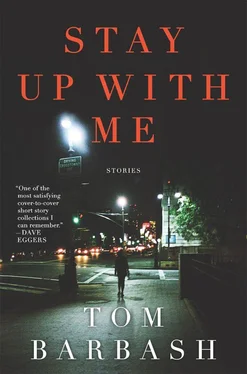I sensed (or was I hoping?) there was some friction between Rachel and Rajiv, though I never observed any cross words between them, and twice heard them talk about wanting to get their own apartment where they could have some privacy.
On the day before spring break, she handed me a paper on Canto 5 of The Inferno . I had taken a stack of papers over to the dark and woody café a block north of the campus where I like to go to hide away from the world. The first seven or eight essays I read were indistinguishable, each with a glimmer or two of earnest intelligence, but predominated by overbaked platitudes. When I got to Rachel Weisman’s paper, I began to slow down to the point where I was rereading for the sheer pleasure of encountering her words again. The ideas were exciting, and the sentences exceedingly lucid, even mesmerizing. It didn’t matter to me that it was substantially shorter than what I’d asked for. I actually preferred it. I read a few of the paragraphs aloud, and then it struck me that something was off about them.
At first I couldn’t tell what, and then I recognized that Rajiv had written the paper. It was in his vocabulary, and it reflected closely his thinking. But then I considered, Wasn’t it perfectly possible and even likely for them to talk about the subject? And wouldn’t she hear some of his ideas and agree with them, and then be unable to avoid them for purposes of forming her own thesis?
I simply heard Rajiv’s tenor voice as I read it, and when I tried to hear hers, the voice wouldn’t come forth. I considered simply asking her to write a different paper, but her response, I knew, would be justifiable outrage. They would both hate me.
The bottom line is I accepted Rachel’s paper, but I only gave her a B. She stormed — or maybe just walked — into my office saying she’d never once in her life gotten a B for a grade; that her worse mark had been a B+. I said: “There’s always a first time, isn’t there?”
Somehow that came out more, well, sexual than I wanted it to, and I realized that we were standing quite close at the time, and I backed away.
She was studying my birthmark again, or maybe my eyes.
“He’s right about you, isn’t he?” Rachel said.
She held her mouth in an ill-mannered smirk.
I said, No, Rajiv wasn’t likely to be right about me. There was much about me my son didn’t know but that was not a conversation I felt like having with a student. The paper was good but I had questions as to its authenticity, I said. She could write an addendum, or she could write a paper on how she’d arrived at her ideas, and I’d certainly have a look.
I thought that afternoon and evening about that line— He’s right about you . And I tried to think of what that might mean. I have never done anything to compromise my position as tenured professor at a first-rate liberal arts college. And even if I had, I couldn’t imagine why my son would report such a thing.
I began to believe that Rachel might bring the matter up with a dean and so I mentally prepared for such a confrontation.
Had my door been ajar?
“It was,” I said in practice.
Did I have any burning reasons for questioning the authenticity of the paper, and was there any reason I had to stand virtually on top of her while I had been having this discussion?
“I wasn’t on top of her, and the paper simply didn’t sound like her.”
And how was it that she knew so much about the inside of my home?
“What did she say about it?”
“What did you mean by there’s always a first time?” the dean would ask me.
“We were talking of her grade,” I would say.
“You were flirting with her while you were talking of her grade?”
“She’s sleeping with my son,” I would say.
“Well, how did that happen?” he would then ask, and I’d have to say, “They met at my house.”
“Did it occur to you that that wasn’t a good idea?”
“How can you stop a couple of horny kids?”
I actually said this aloud.
“It would be best if you refrained from describing a student under your supervision as horny, ” the dean would say.
“I’ve done nothing,” I’d say, but neither of us would believe that was true.
But it never came to that. Ultimately I gave her an A.
Rachel stopped by my room the night after I’d changed her grade, again while I was reading in bed. I had on my pajamas and a robe.
“What the hell was that for?” she said, which is a fairly inappropriate way to talk to your professor. “I didn’t deserve an A.”
She was out of breath and jittery. My son was working late at the newspaper.
“I’d rather not have this conversation in my bedroom if that’s okay, and anyhow I thought you said you deserved an A?”
“I deserved an A minus,” she said. “I only want what I deserve.”
“You’re getting an A.”
“There were no comments on it.”
I noticed that one of her bottom teeth was chipped, her eyes moist and reddened. I wondered about her mental health.
“Your grade was my comment,” I said.
She shook her head in disgust.
“That’s so typical of you.”
“What do you know about me? How do you know what’s typical?” I tried to relax my face; to understand that the world didn’t need to fall apart, but it felt like it was, all my rage and sadness surrounding the divorce, and my problems at the college, and the neighbors had converged within me. “None of this is typical .”
She was too close to me right then. I wanted her to leave. I wanted my son to get back home.
“I bet I remind you of her,” she said.
“Who?”
“Why did she leave you anyhow?”
“What are you talking about?”
She smiled cruelly. “I bet I know.”
“I’d rather not hear your theories, Ms. Weisman. They’re not original enough, and in fact I’d rather if you didn’t continue to live here with us. This isn’t how I’d like to live.”
“Such passion. Such unbridled warmth .”
“I’ve got a lot of warmth for those in my life who merit it, but I’ve really had enough of this if that’s okay with you.”
She looked angry, and then sad.
“You know, Mr. Singh… I really don’t like it when you ignore me in class. It’s very cruel. And it’s really not fair. I’m a good student, one of your best. I tried for two years to get into your course, you know. It isn’t fair to ignore me.”
“Did you write it?” I asked. “Tell me the truth.”
“Who cares?”
“I do for one. The university does for another. You know you can get kicked out for something like this.”
She shook her head in exasperation.
“Of course I wrote it. He never even read it. He just made a big deal about it because he wanted you to take an interest.”
We didn’t see Rachel for two weeks after that, not at home anyhow. She sat in the back of class and never raised her hand. She did all the work, and she left immediately afterward. She and Rajiv were in a holding pattern for now, trying to figure out what was next.
He didn’t hold me responsible, he said. They had their own issues. I felt as though I’d destroyed something, but at the same time I felt as though a burden had been lifted.
A week before the end of school the dean — the one I’d imagined Rachel speaking to — stopped into my office to say that Rachel Weisman was going back to California. She wanted to send her final paper in from there. And she would do any homework I requested but her father had died, and she wanted to be with her mother, the dean said. Her father’s health had been deteriorating for a long time. He’d had two strokes, the last one incapacitating. He’d been a sculptor and photographer, and they’d had a rocky relationship. This last part Rajiv told me.
Читать дальше












